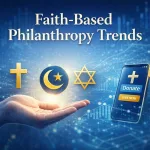
Faith and mental health: what research actually says (and what it doesn’t)
Many wonder how faith molds our minds and emotions, revealing surprising psychological effects that influence resilience and well-being in unexpected ways.
Eastern and Western faiths offer distinct paths in religion and spirituality, shaped by unique histories and cultures. In many Eastern faiths, the focus is on harmony, interconnectedness, and inner transformation through practices like meditation and mindfulness. By contrast, Western faiths often center on individual salvation, moral law, and a personal relationship with the divine. These differences in religion and spirituality affect daily practices, ethical choices, and community life, inviting us to reflect on how faith shapes human experience. Understanding both Eastern and Western faiths can deepen our perspective on religion and spirituality and help us find meaningful connections across cultures.

The historical origins of Eastern religions reveal a rich blend of ideas that began in ancient South Asia and East Asia. In India, Vedic traditions and Hindu scriptures shaped early spiritual beliefs, alongside Jain principles and Buddhist teachings that emphasized ethics, liberation, and meditation.
In China and Japan, Taoist philosophies, Confucian values, Zen Buddhism, and Shinto practices formed distinct paths that still guide daily life and rituals. Together, the historical origins of Eastern religions highlight a deep, interconnected heritage while preserving unique identities across cultures.
For seekers and students alike, exploring the historical origins of Eastern religions offers a clear path to understanding how spirituality evolved across Asia.
Western religions have deep historical origins that trace back to the ancient Near East, where monotheism took shape and spread across regions.
These historical origins include sacred scriptures, religious migrations, and cultural exchanges that helped form core beliefs and rituals.
Over time, philosophical debates within these traditions refined key doctrines, shaping the path of Judaism, Christianity, and Islam.
Eastern faiths emphasize interconnectedness, balance, and inner harmony as core philosophical concepts. These spiritual traditions highlight dharma as a guide to moral duty, karma as a principle shaping cyclical existence, and non-attachment as a philosophy that reduces suffering by loosening the grip of desire.
Mindfulness practices and meditation techniques support the path to enlightenment, while beliefs in interconnectedness affirm the unity of all life, shaping a holistic spiritual worldview.
For anyone exploring religion and spirituality, understanding the core philosophical concepts in Eastern faiths can provide practical guidance for daily living, deepen compassion, and inspire mindful action.
Philosophical principles in Western faiths often center on the relationship between the individual and a transcendent deity, emphasizing faith, morality, and salvation.
Within Western faiths, diverse traditions shape unique moral frameworks, reflecting ongoing philosophical evolution and lived spiritual practice.
These religions address existential questions through doctrines that highlight personal responsibility and divine judgment, setting Western faiths apart within the broader landscape of global religious thought.
In many Eastern traditions, the role of deity is understood differently than in the West. Instead of focusing on a single, all-powerful God, these paths often explore divine essence, cosmic order, and how a deity can serve as a guide on the spiritual journey.
In Buddhism, Hinduism, Taoism, and related practices, a deity may represent qualities like wisdom, compassion, or protection, helping practitioners deepen meditation and daily mindfulness.
Rituals, mantras, and offerings are not just acts of worship; they are tools that align the mind and heart with the ultimate reality. Through this dynamic relationship with a deity, seekers aim for inner peace, enlightenment, and a sense of unity beyond the ego.
In this way, the role of deity in Eastern traditions supports personal growth, ethical living, and a compassionate connection to all beings.
Many Western traditions emphasize a singular, omnipotent deity, and this idea shapes religion, spirituality, and daily life. In these faiths, the role of deity influences moral values, community identity, and how people practice worship.
Most teachings focus on monotheism, supported by sacred texts and trusted religious authority. While polytheistic beliefs do exist, many communities still see divine intervention and a clear spiritual hierarchy as central to their worship.
This approach helps create a unified understanding of the divine in Western religion and spirituality. By exploring the role of deity across traditions, we gain insight into how religion, spirituality, and culture evolve together.
In Eastern religions, the afterlife is often understood through cyclical ideas of existence, where life, death, and rebirth are interconnected. Key beliefs in reincarnation and karma shape how actions in this life influence future lives, making moral choices deeply meaningful.
Many seekers in Eastern religions pursue spiritual liberation—often called moksha or nirvana—through meditation, ethical living, and enlightenment practices that resolve suffering within the wider cosmic order. Ancestral worship also plays a central role, honoring family lineages and maintaining bonds beyond death.
Rather than focusing on a single final judgment, Eastern religions emphasize continuity, growth, and the soul’s ongoing journey in the afterlife.
Western religions commonly emphasize a linear understanding of life and the afterlife, where each person lives a single earthly life followed by eternal reward or punishment.
In many teachings within Western religions, spiritual resurrection plays a central role, highlighting the revival of the soul and the promise of life beyond death.
This perspective in Western religions often includes the hope of heavenly rewards for the righteous, standing in contrast to cyclical beliefs found in other spiritual traditions.
Ritual practices and worship in Eastern faiths play a central role in daily spiritual life, helping followers connect with the divine and cultivate inner growth. These traditions often include meditation, communal rituals, and pilgrimage inspired by sacred texts.
Seasonal festivals feature spiritual music, symbolic offerings, and creative arts that invite people of all ages to participate. By highlighting ritual practices and worship through shared ceremonies and mindful practices, Eastern faiths strengthen community bonds and deepen devotion.
Whether through quiet meditation or vibrant festivals, ritual practices and worship support a living experience of religion and spirituality that is both meaningful and accessible.
Ritual practices and worship play a powerful role in shaping spiritual life within Western faith traditions. Through ritual practices and worship, believers gather around sacred texts, engage in symbolic actions, and use diverse prayer techniques to deepen their connection with the divine.
Seasonal festivals mark key moments in the religious calendar, while music and chant enhance reverence and create a shared spiritual atmosphere. Personal devotion also supports communal life, balancing private prayer with collective rituals.
Together, these elements of ritual practices and worship encourage reflection, strengthen community bonds, and sustain continuity across generations in Western religious communities.
Ethical teachings and moral codes in Eastern religions play a central role in shaping personal behavior and social harmony. Across traditions, Eastern religions highlight compassion, karma, and dharma as guiding principles for daily life.
They encourage non-violence, mindful living, and spiritual discipline, promoting altruistic actions, community well-being, and reflective morality. By following these ethical teachings and moral codes in Eastern religions, practitioners cultivate balance, purpose, and responsibility.
Ultimately, the ethical teachings and moral codes in Eastern religions help individuals align their actions with a deeper spiritual path while supporting a more harmonious society.
Ethical teachings and moral codes in Western religions play a key role in shaping everyday life and community values. In many traditions, especially Christian ethics, these teachings are rooted in scripture and divine commandments, guiding believers toward compassion, personal responsibility, and service.
While debates about moral relativism persist, social justice remains central, reflecting a deep commitment to fairness, care for the vulnerable, and the common good.
By highlighting ethical teachings and moral codes in Western religions, we see how faith informs behavior, strengthens communities, and nurtures a meaningful spiritual life.
These ethical teachings and moral codes in Western religions continue to influence both personal choices and broader cultural norms.
In the East, religion and culture are closely connected. The influence of culture on religious expression is clear in daily life, community events, and personal beliefs. Spiritual symbolism, group rituals, and meditation practices all reflect local customs and values. This shows how the influence of culture on religious expression shapes how people pray, celebrate, and seek meaning.
History also plays a key role. Migrations, trade routes, and language changes have helped traditions blend and evolve.
Folk practices and religious festivals inspire art, music, and storytelling, creating a living heritage. These elements highlight the influence of culture on religious expression by showing how Eastern faiths adapt over time while keeping their deep spiritual roots.
The influence of culture on religious expression in the West is clear, as traditions evolve alongside changing values and social trends.
While many practices are rooted in history, religious expression adapts to modern life through new symbols, inclusive communities, and fresh interpretations of sacred texts.
This blend of heritage and innovation helps spirituality stay meaningful, showing how religious expression responds to contemporary concerns without losing its core.
As cultures connect and ideas merge, we also see syncretism, where different beliefs shape shared rituals and language.
Ultimately, religious expression in Western society remains dynamic, balancing tradition and transformation to keep faith relevant today.
Eastern and Western faiths reveal distinct approaches to spirituality shaped by history and culture. In many Eastern faiths, spirituality centers on interconnectedness, balance, and communal harmony, often practiced through meditation, mindfulness, and philosophical reflection. By contrast, Western faiths typically emphasize individual salvation, personal responsibility, and living by clear scriptural ethics. These differences show how Eastern faiths and Western faiths interpret the divine, morality, and life’s purpose in unique ways, highlighting how cultural values influence religious expression and the spiritual journey across traditions.

Many wonder how faith molds our minds and emotions, revealing surprising psychological effects that influence resilience and well-being in unexpected ways.

Faith-based philanthropy trends reveal a reality that is often misunderstood: charitable giving rooted in faith has never been static. From the earliest forms of communal offerings in ancient civilizations to structured religious obligations such as tithing, zakat, and tzedakah, faith-based generosity has continuously evolved alongside social, economic, and technological transformations. Introduction: Faith at the Crossroads […]

A deep exploration of how faith shapes moral choices reveals complexities that challenge simple answers and invite thoughtful reflection.

Understanding faith across religions reveals shared truths and unique beliefs—unlocking mysteries that connect humanity in unexpected ways. Discover more inside.

Strengthening bonds and shaping values, faith plays a crucial role in communities—discover how it influences unity and resilience in unexpected ways.

Struggling between conviction and uncertainty, faith and doubt intertwine in ways that challenge beliefs and reveal unexpected spiritual depths. Discover the paradox within.